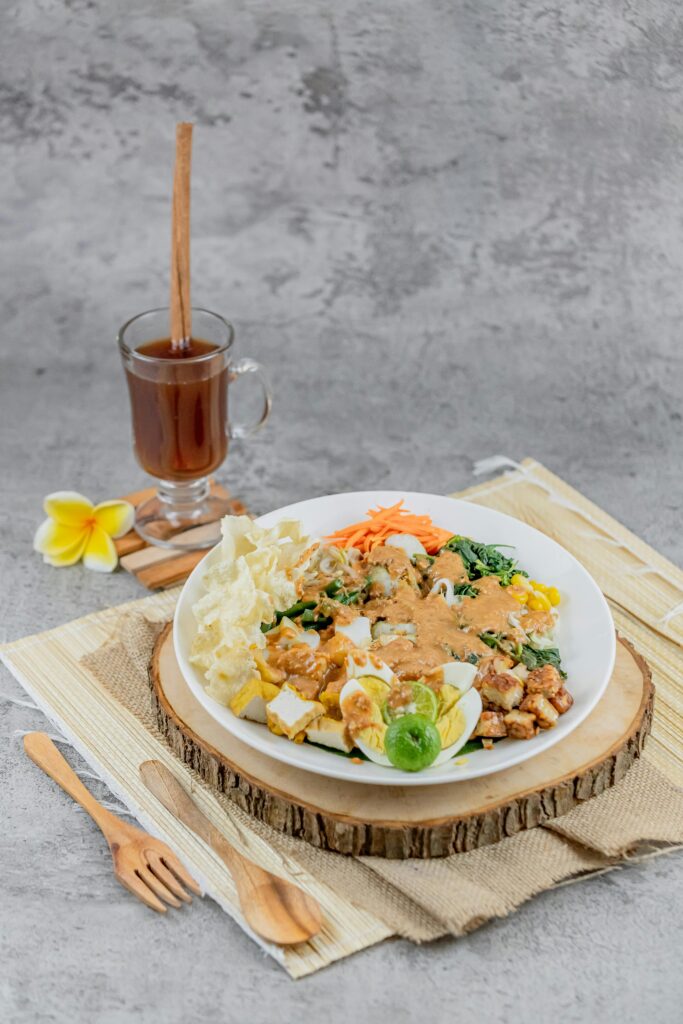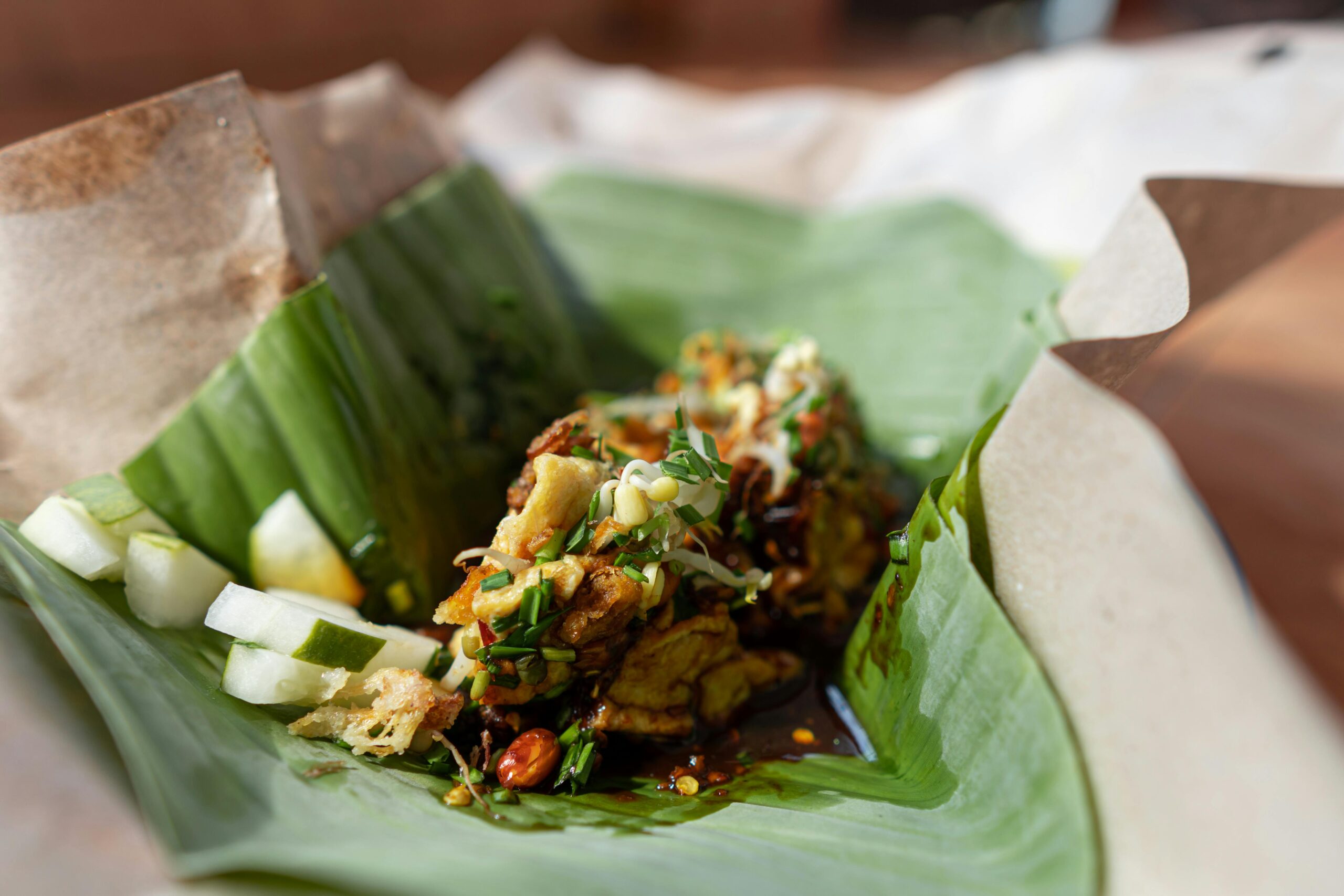A Culinary Gem from Java: What Makes Pecel Madiun Stand Out
Among Indonesia’s kaleidoscope of dishes, Pecel Madiun emerges as a rustic yet refined creation. Originating from East Java, this traditional salad captivates with its vivid array of vegetables, draped in a luscious peanut sauce that tingles the senses. It is not just a meal; it is an edible narrative — one that tells the story of simplicity, balance, and community.
The Dish That Defines Indonesian Home Cooking
Pecel Madiun embodies the spirit of home. Every spoonful echoes the nurturing essence of family kitchens and bustling morning markets. It is the kind of dish mothers prepare before dawn, packing comfort and nourishment into every bite. Within its humble ingredients lies a profound truth: Indonesian cuisine finds beauty in balance, not extravagance.
The Story Behind Pecel Madiun
The Birthplace: Madiun, East Java’s Culinary Capital
Nestled between majestic hills and fertile plains, Madiun is a town where agriculture and artistry intertwine. Here, food is not merely sustenance — it is heritage. Pecel was born from the hands of farmers and vendors who used locally grown produce to create a meal that was both practical and flavorful.
From Humble Beginnings to National Pride
What began as a farmer’s breakfast quickly evolved into a national treasure. As traders traveled across Java, they carried Pecel with them, allowing the dish to transcend borders and palates. Today, Pecel Madiun represents Indonesia’s unity in diversity — a culinary anthem sung in every province.
How Pecel Became Synonymous with Javanese Simplicity
Javanese culture prizes modesty, and Pecel is its edible reflection. The dish requires no opulent ingredients or complex techniques — just patience, care, and fresh produce. Its simplicity is deceptive; beneath its unassuming appearance lies an orchestra of textures and flavors that embody the Javanese philosophy of harmony.
What Is Pecel Madiun?

Photo by Pixabay / Free to use under license.
The Soul of Indonesian Salad Culture
Pecel is Indonesia’s answer to the salad — though far more indulgent and soulful. It unites the earthiness of vegetables with the warmth of roasted peanuts, resulting in a deeply satisfying yet balanced meal.
A Harmony of Fresh Vegetables and Creamy Peanut Sauce
Each component in Pecel plays a vital role. The crispness of bean sprouts contrasts beautifully with the velvety peanut sauce, while leafy greens add freshness. It’s a dance between flavor and texture that enchants the palate.
Why Pecel Madiun Embodies the Spirit of “Nusantara” Cuisine
Indonesia’s archipelago cuisine celebrates diversity through unity. Pecel Madiun exemplifies this — simple, adaptable, and universally loved. Its regional variations prove that one recipe can wear many faces while retaining the same soul.
The Secret of the Signature Peanut Sauce
The Core Ingredient: Roasted Peanuts and Their Distinct Aroma
The sauce begins with humble peanuts — roasted to perfection until golden and fragrant. This foundation lends the sauce its deep nutty aroma, setting the stage for layers of complexity.
Spices That Tell a Story: Chilies, Tamarind, and Palm Sugar
Every spice in Pecel has a purpose. Chilies bring heat, tamarind adds tang, and palm sugar offers caramel sweetness. Together, they weave a tale of balance that’s uniquely Javanese.
Grinding Traditions: Mortar and Pestle vs. Modern Blender
Traditionally, the sauce is ground using a stone mortar, releasing natural oils that intensify the flavor. While blenders offer convenience, they can’t replicate the rustic texture and warmth of hand-ground peanuts.
The Perfect Balance: Sweet, Savory, and Spicy in One Bite
True mastery lies in proportion. Pecel’s peanut sauce must not overwhelm — it should enhance, coating each vegetable in a creamy embrace without masking its freshness.
Vegetables That Bring Life to Pecel
Classic Ingredients: Spinach, Long Beans, and Bean Sprouts
These are the backbone of Pecel — vibrant, nutritious, and abundant. Their colors mirror the lush landscapes of Java, offering both nourishment and aesthetic delight.
Local Greens You Can’t Miss: Kenikir, Kacang Panjang, and Kangkung
Local herbs like kenikir add an herbal bitterness that cuts through the richness of the sauce. Kangkung (water spinach) contributes a mild crunch, balancing the ensemble.
How Each Vegetable Contributes to the Texture and Flavor
Pecel thrives on contrast — tender, crisp, soft, and chewy, all coexisting harmoniously. Each bite surprises, yet feels familiar.
Tips for Preparing and Blanching Vegetables the Javanese Way
The key is timing. Vegetables should be blanched briefly, just enough to awaken their color and maintain a subtle bite. Overcooking is the enemy of Pecel’s freshness.
Essential Companions of Pecel Madiun
Rempeyek: The Irresistible Peanut Crackers
Rempeyek is the crown jewel — a thin, crispy cracker studded with peanuts, adding texture and crunch to every mouthful.
Tahu and Tempe: Indonesia’s Beloved Plant-Based Proteins
Golden-fried tofu and tempeh bring protein and heartiness, absorbing the sauce like culinary sponges.
Lontong or Nasi: The Eternal Question of Rice Pairing
Whether with rice cakes or steamed rice, Pecel finds its perfect companion. Lontong offers chewiness; nasi provides comfort.
Fried Accents: Bakwan, Fried Chicken, and Egg Enhancements
Side dishes elevate Pecel into a feast. A crispy fritter or perfectly fried egg transforms it from a light meal to a celebration.
Regional Twists and Variations
Pecel Madiun vs. Pecel Ponorogo: A Flavorful Rivalry
While Madiun’s version is delicate and balanced, Pecel Ponorogo leans bolder — spicier and thicker in texture.
The Distinctive Touch of Pecel Blitar and Pecel Kediri
Blitar adds petai and herbs, while Kediri opts for a richer peanut base. Each region tells its story through spices.
How Local Ingredients Shape Regional Identities
Geography dictates flavor. The soil, the produce, and even the water shape the essence of each Pecel variant.
Pecel’s Place in Indonesian Culture
A Morning Staple in Javanese Households
In Java, Pecel is breakfast — sold at dawn, wrapped in banana leaves, and eaten before the day’s toil begins.
The Role of Pecel in Festivities and Ceremonial Feasts
From weddings to community gatherings, Pecel symbolizes togetherness — a dish meant to be shared.
Pecel as a Symbol of Community and Togetherness
More than sustenance, it’s a bond between generations. Families pass down recipes like heirlooms, preserving memory through flavor.
The Art of Serving Pecel Madiun
Traditional Presentation on Banana Leaves
Banana leaves are more than packaging; they infuse aroma and authenticity, turning every meal into a sensory experience.
How to Layer Ingredients for a Perfect Serving
The sauce always comes last — generously drizzled atop the vegetables, allowing diners to mix to their liking.
The Visual and Aromatic Appeal of an Authentic Plate
A medley of colors, textures, and scents — Pecel engages every sense before the first bite.
Modern Interpretations of Pecel
From Street Food to Fine Dining: The Evolution of Pecel
Once humble street fare, Pecel now graces modern restaurants, elevated with artistic plating yet rooted in nostalgia.
Health-Conscious Versions for the Modern Palate
Chefs reduce sugar, air-fry rempeyek, and use organic produce — giving Pecel a contemporary glow without losing its essence.
Creative Fusions: Pecel in Wraps, Bowls, and Western Plates
Global trends have embraced Pecel in salads, wraps, and even pasta — proof of its adaptability and timeless charm.
Nutritional Benefits of Pecel Madiun
A Wholesome Meal Packed with Protein and Fiber
With peanuts, tofu, and greens, Pecel offers a balanced blend of nutrients that energize without excess.
The Role of Peanuts and Vegetables in Balanced Nutrition
Peanuts provide healthy fats, while vegetables deliver vitamins and minerals, making Pecel both delicious and nourishing.
Why Pecel Is a Perfect Fit for a Healthy Lifestyle
It’s plant-forward, naturally gluten-free, and brimming with antioxidants — a health-conscious choice rooted in tradition.
How to Make Pecel Madiun at Home
Choosing the Right Ingredients for Authentic Flavor
Freshness is paramount. Select vibrant greens, high-quality peanuts, and genuine palm sugar for authenticity.
Step-by-Step Guide to Preparing the Peanut Sauce
Roast, grind, season, and thin with warm water — the key is patience, not haste.
Techniques to Maintain the Perfect Vegetable Texture
Blanch, shock in cool water, and drain — ensuring each bite retains life and crunch.
Common Mistakes to Avoid in Homemade Pecel
Avoid overly thick sauce, limp vegetables, and excessive sweetness. Balance is the soul of Pecel.
Where to Find the Best Pecel Madiun
Iconic Street Vendors in Madiun and Surrounding Areas
The city streets come alive at sunrise, with vendors serving Pecel on banana leaves, steaming and aromatic.
Hidden Gems in Jakarta, Yogyakarta, and Surabaya
Urban food lovers can still find authentic Pecel tucked in family-run warungs and local markets.
Online Options: Packaged Pecel Sauce for Easy Enjoyment
For those abroad, ready-made sauces capture the essence of Madiun — a taste of home wherever you are.
Pecel and Indonesian Street Food Culture
Why Pecel Stands the Test of Time Among Street Foods
Its affordability, flavor, and nostalgia make Pecel a timeless street-side favorite.
The Role of Warungs in Preserving Traditional Recipes
These humble eateries are living museums, where heritage and flavor coexist.
Street Food Etiquette and Dining Experience in Java
Sitting cross-legged, eating from banana leaves, and sharing laughter — that’s the Pecel way.
Global Recognition of Pecel
How Indonesian Expats Bring Pecel to the World
Through home kitchens and pop-up stalls, Indonesians abroad introduce Pecel to curious palates.
International Food Festivals Showcasing Pecel
Global culinary events celebrate it as a symbol of Indonesia’s rich food heritage.
Foreign Chefs Embracing Indonesian Peanut Sauce Dishes
Renowned chefs reinterpret Pecel, blending it with Western techniques while honoring its roots.
Perfect Pairings with Pecel Madiun
Traditional Drinks: Teh Poci, Wedang Jahe, and Es Dawet
These traditional beverages enhance the earthy, nutty tones of Pecel while soothing its gentle heat.
Modern Beverage Pairings That Complement the Flavor
Cold-brew tea, citrusy mocktails, or coconut water bring freshness to the dish’s richness.
Desserts That End a Pecel Meal on a Sweet Note
Finish with klepon or serabi — delicate sweets that balance the savory indulgence of Pecel.
Cultural Symbolism of Pecel
The Philosophy of Harmony in Javanese Cuisine
Javanese cooking seeks equilibrium — between flavors, textures, and even emotions. Pecel personifies this balance.
How Pecel Reflects the Indonesian Value of Togetherness
Food is a communal act in Indonesia. Pecel invites sharing, reinforcing unity at every table.
The Dish as an Expression of Gratitude and Simplicity
Every bite is a reminder of gratitude — to the earth, the cook, and the community that keeps traditions alive.
Preserving the Heritage of Pecel Madiun
Local Efforts to Promote Pecel Tourism
Culinary tours in Madiun now celebrate Pecel as both art and heritage, connecting travelers to its roots.
Culinary Education and Recipe Preservation in Java
Schools and communities document ancestral recipes, ensuring that no flavor fades into memory.
Supporting Small Vendors and Traditional Producers
By choosing local warungs and artisans, diners help sustain livelihoods and cultural identity.
Pecel in the Digital Age
Social Media Trends and Pecel’s Online Popularity
Instagram and TikTok have turned Pecel into a visual sensation — its colors and textures irresistible to the digital eye.
Food Bloggers and Influencers Reviving Local Dishes
Through storytelling and creativity, modern voices are reintroducing Pecel to younger generations.
How Pecel Inspires the Next Generation of Indonesian Chefs
Aspiring chefs draw from Pecel’s essence — innovation rooted in respect for tradition.
Conclusion
Why Pecel Madiun Represents the Heart of Indonesian Cuisine
It is modest yet profound, simple yet layered — a dish that mirrors Indonesia’s spirit of unity and authenticity.
A Celebration of Flavor, Culture, and Community in Every Bite
Pecel Madiun is more than food; it is a heritage preserved on a plate — a celebration of life, love, and the vibrant soul of Java.




